- Bernard Preston homepage
- Hummus
- Broad Bean Hummus
Broad bean hummus
Broad bean hummus simply uses a different legume, whatever is in season to prepare this ancient extremely nutritious recipe; traditionally it is made with chickpeas.
Since the very earliest times, man has supplemented his protein requirements with legumes; broad beans apparently contain all the essential amino acids. But still the extra methionine from the sesame seed is important for vegetarians.
This page was last updated by Dr Bernard Preston on 9th March, 2024.
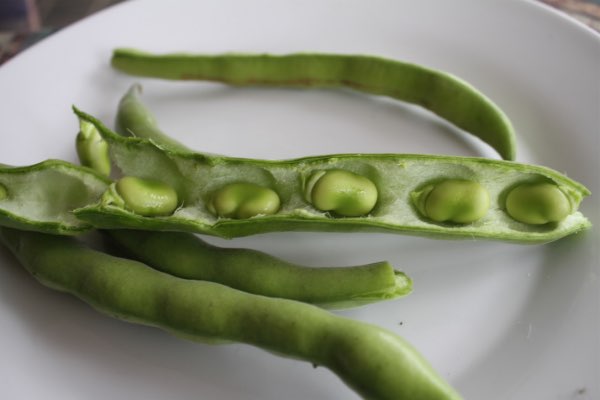
The World Health Organization has raised a red flag by changing the status of animal protein from possibly to probably carcinogenic. Frankly it is most likely more to do with the barbaric way in which beef, pork and chickens are raised, rather the meat per se.
Our traditional authentic hummus has stood the test of time; we have enjoyed it virtually every day for twenty years with our green salads. I give it much of the credit for our sparkling well-being; chickpeas are also known as garbanzo beans.
But I strongly believe that cooking directions are only a start to our food preparations and I never allow my own creativity to be stifled by someone else's ideas; even those of my own, simply because I have been doing it in a particular way for a long time.
Right now we have a glut of broad beans, also known as favas; soon it will be green peas. So I am experimenting.
The basic ingredients of our authentic hummus are chickpeas, tahini and lemon; cumin, parsley and olive oil too. Today we are going to use fava beans.
Incidentally these beans are awful when old and starchy. I only recommend this if you can get fresh young fruit; actually they are not difficult to grow.
Fava beans nutrition will give you more information behind this magnificent legume and in particular its use in the management of Parkinson's disease.
Favas are the the only natural source of L-dopa.
Broad bean hummus
Broad bean hummus is a variation of our traditional authentic recipe.
- One cup of young, green broad beans.
- One tablespoons water.
- Two tablespoons extra virgin olive oil.
- One half TBSP tahini.
- One half tsp cumin.
- Sprig of parsley.
- One half of a lemon or lime, peeled and depipped.
- One TBSP sweet fruit like mango or papaya.
- Optional: slither of chilli and a clove of garlic.
- 1/2 tsp coarse salt.
Boil the beans for about five minutes until they are tender; drain and set aside.
In your hummus container, where you would normally store it add all the other ingredients; using a hand blender, froth it up. There is no need to dirty another bowl.
Add the cooked broad-beans and blend until smooth; that's it, you are done. What could be easier?
It is my frank opinion that we have been hoodwinked into believing that we have only to eat those foods that titillate our taste buds; admittedly a salad can be rather boring if you do not have access to fresh lettuce and other greens from your own garden.
So just add a teaspoon or two of some relish; this broad-bean hummus is just one example.
It could be your own homemade mayonnaise or our easy pesto, using whatever ingredients that are readily available.
The goal is to enjoy at least seven to ten different coloured foods every day; strong research shows that you will reduce your all-cause of death by a massive 33 percent. I am sure that resonates with you like it does with me. Do you too not hate being sick and taking pills?
Our broad bean hummus is not that exciting either which is why we add the garlic and chilli; actually I prefer the peppadew that we grow in profusion but you could use some jalapeno or even super-hot habanero.
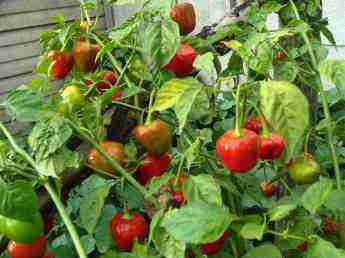
These peppadews will add a touch of colour to any flowerbed by the way and they are super-delicious and not too fiery. One can eat at least two or three every day.
Growing peppadews is a passion with us; so easy and the capsaicin is a very important natural anti-inflammatory substance.
Tahini
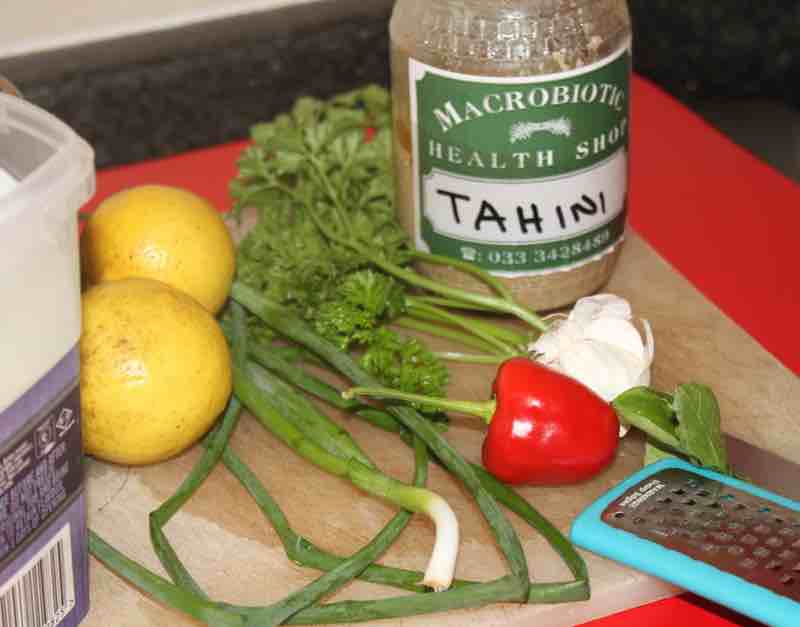
Tahini is a paste you may not be familiar with; I was not until coming into contact with the Turkish and Lebanese folk whilst living in Holland. It is a roasted sesame paste, not unlike peanut butter but we think nicer.
It is an essential ingredient of any hummus. You can make your own from sesame seeds but I recommend not; the people of the Mediterranean seem to do it better and cheaper.
The amino acids in sesame seeds turn hummus into a complete protein; they are rich in methionine, deficient in most legumes.
Lemon
Growing lemon trees is not difficult unless you live in a place like Chicago or Amsterdam.
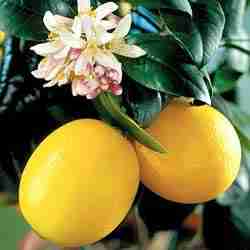
Never use bottled lemon juice; it is too awful for words. If you do not have a tree in the garden, buy a couple every week; they are so healthy and give any dish some zip.
An old saying is first up when moving into a new home, plant a lemon or lime tree. I could not agree more; it is more important that getting the television connected if you want to live long in the land.
I have just counted 250 lemons on the tree we planted nearly forty-years ago; a quick calculation reveals that we have enjoyed about two thousand dollars worth of fruit from it at the current price. Now that I call a decent return on the money we spent on a young sapling so long ago.
The scent of the flowers alone makes a lemon tree a wonder in any garden; add to that the beauty of the fruit and super nutrition of the juice and pulp. Now you have a winner.
Likewise a pot of fresh parsley is not just a garnish but a very important condiment; and they both will constitute part of your list of coloured foods. Do not make a fetish of it; just reach for lemons, peppers and green herbs on a regular basis.
I have a few final thoughts; we have made our authentic hummus twice a week for years. It takes you only five minutes once you have the ingredients on hand and get into the rhythm. It is so easy.
This broad bean hummus is just an experiment and has been so successful. Try it with your salads, if you grow favas. Incidentally many Parkinsons's patients find that half a cup provides far better relief from this nasty disease than the very expensive medication; and may help to prevent it by providing L-dopa.
That's why how to plant broad beans is so important to us; prevention remains better than a cure. Young and tender they taste great; old and starchy they are awful.
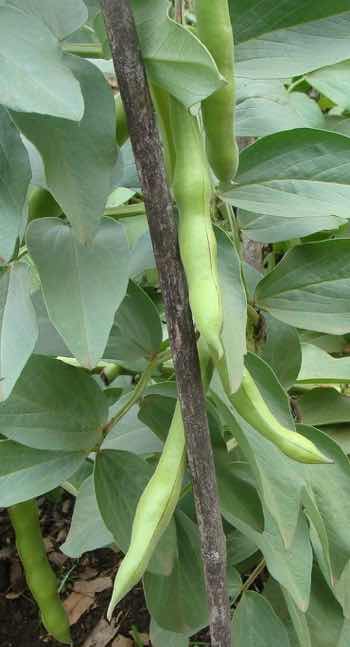
Growing broad beans is best in a cool dry climate if you have unlimited inexpensive irrigation available. Water scarcity in the world has to be faced. We get around it by harvesting and storing the rain in an underground reservoir.
Byesar
Imagine my surprise. Having started out with what I thought was an entirely original dish, I discovered the housewives in Morocco have been making byesar for centuries; it is really just broad bean hummus.
It is traditionally made with dried fava beans which are soaked overnight, cooked for several hours and then blended with the same ingredients as used for chickpea hummus.
I prefer my way using young, green broad beans. Would a rose smell any different if you gave it another name? Byesar or broad bean hummus, it is all the same; a fantastic side dish to go with any salad.
Podding broad beans
Our motto at Bernard Preston is slow food, made fast. Unfortunately podding enough broad beans to make hummus twice a week means that it becomes a laborious business.
My advice is keep broad bean hummus for an occasional treat, enjoying that with chickpeas as your daily fare. Enjoy a handful of these favas as they are also known regularly with your cooking, especially if you have any sort of a tremor.
Increasing research is pointing to a happy colon as the best way to prevent the nasty degenerative diseases; did you know that you have a stunning 2kg of bacteria, yeasts and viruses in a healthy alimentary canal? That's a lot more cells than in your body. Enjoying a probiotic like kefir regularly is the way to do it.
Make your kefir benefits at home to supplement the resistant starch in broad bean hummus to ensure you have a happy tum; and do not get the dreaded Big A, or P. Those are the neurodegenerative diseases so prevalent in our modern world; losing your marbles.
Very low carb diets
Finally the obese world is getting around, very reluctantly to accepting that it is carbs and particularly the refined starches that are adding on the pounds that are leading us to pain, pills and disability. That means all commercial bread, white rice and most pastas; and cake flour and sugar too obviously.
Ketogenic diets have their place but eschewing all legumes invites many questions; broad bean hummus would be out of the question.
Unfortunately all carbs are coming under the spotlight. If you are seriously overweight, then I strongly recommend that you borrow or purchase a glucometer and test what legumes in general and hummus in particular does to your blood sugar.
Use of a continuous glucose monitor for a month would be an excellent option.
New research in Lancet confirms that low carbohydrate diets are indeed associated with lower mortality, but only if you get the increased fat and protein from plant-derived sources like broad beans and olive oil. Consume them from meat and dairy and you will increase your risk of death.(1)
Read more about weight loss research; in essence none of the diets work. They are one of the biggest cons in history; they simply aren't sustainable. Those who will not reduce refined carbs are destined to much pain and many pills.
Watch this space; I will be testing myself. I too am prediabetic. At this stage I want to know what happens when I have broad bean hummus with a green salad.
We all react differently to carbs; it is possible you should not be enjoying byesar if you are obese. I suspect though that the added fat from the tahini and the protein from the broad beans or chickpeas means that it will be fine; test yourself.
Having said that, to lose weight you have to get your starch under 50 grams per day; it can be done. Try doing it for five days in the week for example.
There are reports that favas have a high glycemic index but that is because traditionally the old starchy broad beans need to be peeled; enjoy them rather fresh and young straight from the garden. Do not skin them.
Salt in hummus
Legumes have very little flavour so add various spices and herbs; and salt too.
0.5 tsp of salt weighs about 3 grams, in 20 TBSP of broad-bean hummus; that is about 8 mg per spoonful.
Mostly we consume far too much salt in our diets. It is strongly associated with cardiovascular disease; strictly no more than 5 g per day and that is probably too much. Most of it comes in processed foods, not that prepared in your own home.
More than a quarter of South Africans consume double the recommended amount.
Reducing our salt by one gram per day would result in nearly 10,000 fewer deaths annually from myocardial infarction and stroke according to the Heart Foundation; that is massive.
There is only a small amount in your hummus. Don't fuss.
When browsing use right click and "Open Link in New Tab" or you may get a bad gateway signal.
Newsletter
Our newsletter is entitled "create a cyan zone" at your home, preserving both yourself and Mother Earth for future generations; and the family too, of course. We promise not to spam you with daily emails promoting various products. You may get an occasional nudge to buy one of my books.
Here are the back issues.
- Lifestyle and ideal body weight
- What are ultra-processed foods?
- Investing in long-term health
- Diseases from plastic exposure
- Intensive lifestyle management for obesity has limited value
- A world largely devoid of Parkinson's Disease
- The impact of friendly bacteria in the tum on the prevention of cancer
- There's a hole in the bucket
- Everyone is talking about weight loss drugs
- Pull the sweet tooth
- If you suffer from heartburn plant a susu
- Refined maize meal and stunting
- Should agriculture and industry get priority for water and electricity?
- Nature is calling
- Mill your own flour
- Bake your own sourdough bread
- Microplastics from our water
- Alternative types of water storage
- Wear your clothes out
- Comfort foods
- Create a bee-friendly environment
- Go to bed slightly hungry
- Keep bees
- Blue zone folk are religious
- Reduce plastic waste
- Family is important
- What can go in compost?
- Grow broad beans for longevity
- Harvest and store sunshine
- Blue zone exercise
- Harvest and store your rainwater
- Create a cyan zone at your home
Did you find this page interesting? How about forwarding it to a friendly book or food junkie? Better still, a social media tick would help.
- Bernard Preston homepage
- Hummus
- Broad Bean Hummus
Address:
56 Groenekloof Rd,
Hilton, KZN
South Africa
Website:
https://www.bernard-preston.com